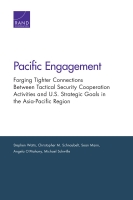by Stephen Watts
How can security cooperation (SC) planning and evaluation processes be improved to link strategic and tactical goals for SC activities?
 Security cooperation (SC) events should forge strong relationships with U.S. partners, help develop partners' military capabilities and ability to operate with U.S. forces, and facilitate access to foreign countries in the event of a contingency. This report examines U.S. Army SC processes in the Pacific Command area of responsibility to forge stronger links between strategic and tactical levels in the planning and execution of SC activities. Researchers developed a framework to link tactical- and operational-level SC activities with strategic goals and found ways to identify information requirements for units executing SC activities and improve evaluations. Researchers found that planning for SC events could be improved by providing additional clarity in the orders process and strengthened knowledge management to aid tactical planners. SC evaluations at the strategic level could be improved through better specifications of the linkages between SC events and expected outcomes and at the tactical level through process improvements in the conduct and dissemination of after-action reports.
Security cooperation (SC) events should forge strong relationships with U.S. partners, help develop partners' military capabilities and ability to operate with U.S. forces, and facilitate access to foreign countries in the event of a contingency. This report examines U.S. Army SC processes in the Pacific Command area of responsibility to forge stronger links between strategic and tactical levels in the planning and execution of SC activities. Researchers developed a framework to link tactical- and operational-level SC activities with strategic goals and found ways to identify information requirements for units executing SC activities and improve evaluations. Researchers found that planning for SC events could be improved by providing additional clarity in the orders process and strengthened knowledge management to aid tactical planners. SC evaluations at the strategic level could be improved through better specifications of the linkages between SC events and expected outcomes and at the tactical level through process improvements in the conduct and dissemination of after-action reports.
Key Findings
The existing security cooperation (SC) planning coordination system generally functions well, though challenges remain. Many processes do not adequately ensure that the right information gets to the right people. The participants in exercise planning events, for instance, are often different from the personnel who will ultimately conduct those events, but no authoritative record of the planning conferences is transmitted to the SC event executors. These process issues are exacerbated by personnel turnover and shortfalls.
Several of the planning coordination problems identified by interviewees were caused by inconsistent adherence to established practice, rather than problems with the system itself.
At a conceptual level, the SC strategic evaluation process in many cases does a poor job of specifying the intermediate outcomes that should be observable if SC events are indeed contributing to strategic-level goals.
In addition, many of the data necessary to make informed SC evaluations are not currently being collected.
Recommendations
Improve knowledge management (accessible country folders with details on logistics and other requirements, cultural information, etc.), as well as evaluation tools.
Work to improve the critical content of after-action reports, potentially using any one of a number of well-established processes for facilitating such analyses.
Develop measures of effectiveness and measures of performance that more appropriately reflect intermediate military objectives and tasks.
A waiver from the State Department could allow the issuance of official passports without requiring flight schedules and manifests.
Develop and disseminate strategic communications themes for SC and relate those themes to specific SC activities.
No comments:
Post a Comment